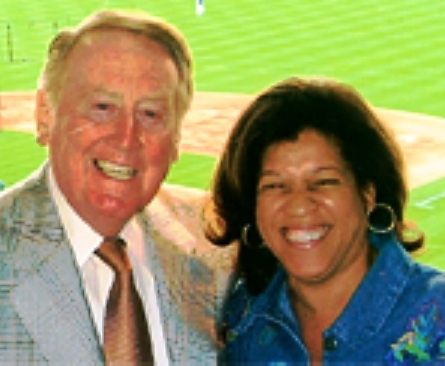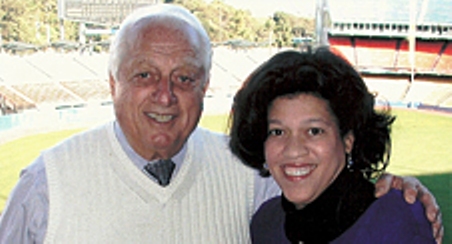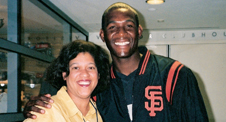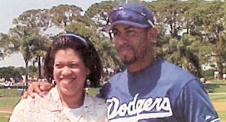
Luchy with Vinny "The Voice" Scully
She may not share the same name recognition as either Dodger announcer Vin Scully or legendary Dodger Manager Tommy Lasorda, but Luchy Guerra, the team’s longtime assistant director of international player development — representing less than a handful of women to reach such a lofty position in Major League Baseball before starting her own business, Athlete Live Management Group in 2008 — has just as many colorful stories and anecdotes.
In 2001, she persuaded the Dodgers to transfer Adrian Beltre to a Los Angeles hospital after the slugger had suffered a burst appendix and languished 18 days in a Dominican hospital. She and her husband, Jim, met Beltre at the airport and whisked him to a hospital.
In 2003, after the New York Yankees traded Yehency Brazoban to the Dodgers, she was the first to welcome the pitcher and get his visa in order after hunting him down in the remote village of Palenque in the Dominican Republic.
Another time, at spring training for the Dodgers in Vero Beach, where she spent seven weeks of every year from 1992 to 2008 helping the team’s international players acclimate to U.S. culture, she helped Raul Mondesi’s wife order pizza with “pepperoni,” a word the slugger’s wife had trouble pronouncing.
When Frank and Jamie McCourt bought the Los Angeles Dodgers in 2004, it was Luchy who was asked to accompany the McCourts in their private jet to the Dominican Republic and give the new owners a personal tour of Campo Las Palmas, the Dodgers’ elite Dominican baseball academy.
Upon returning Frank said, “Most of us can’t appreciate the transition these players make, trying to work their way to the Dodgers despite culture and language barriers. Imagine if the roles were reversed. Luchy has a great awareness of what the players go through.”
That appreciation stems from Luchy’s own upbringing in San Pedro de Macoris in Santo Domingo, where she and five other brothers and sisters grew up for many years without the benefit of electricity or a television.
“We finally got a black and white TV from a relative in New York,” said Luchy. “People thought we were rich because of that TV.”

Luchy and Tommy Lasorda
Although she and her siblings hailed from the “shortstop” capital of Latin America, Luchy preferred books to baseball and devoured them by candlelight.
“My father watched a lot of baseball on TV, but I just wasn’t interested,” she said.
Luchy, however, was very much interested in coming to the United States.
“Absolutely, it’s everybody’s dream,” Luchy said. Her dream started forming when she was 10-years-old.
“I visited New York, and my uncle said, ‘Hey, get ready. When you’re college age, you’re coming to live with us.’”
In her teens, Luchy attended regular high school and then night school to improve her English. Although she was accepted to attend the University of Maryland, it took the self-proclaimed bookworm two more years to reach the United States.
“You have to come with the proper documentation,” Luchy said. “You can’t just say you’re going to attend college somewhere. A college has to accept you, then the proper immigration papers have to be filed.”
The American consulate was skeptical that a poor family from the D.R., as Dominican expatriates refer to their homeland, had the resources to send a child to the states to study. But with her aunt and uncle serving as her sponsor, she reached the United States in 1984.
“The spring before I started school, I took English as a Second Language class each morning and went to a Smithsonian museum every afternoon, learning everything I could about English,” she said.
Making ends meet her first two years at the University of Maryland was difficult, according to Luchy. She was eligible for scholarships.

Luchy and the Giants Frank Rodriguez.
“When one comes to the United States on a student visa, even to this day, one has to pay out-of-state tuition,” she explained. “Foreign students are assumed to be rich or have a rich uncle.”
After two years as a Maryland Terrapin, she transferred to the University of the District of Columbia, from which she graduated in 1989 with a degree in business management.
After her boyfriend Jim Guerra, whom she met at the University of Maryland, wanted to move to California and pursue a doctorate at the Fuller Seminary in Pasadena, the couple headed west where Jim enrolled at the seminary and Luchy began working as an assistant to the college’s vice president of finance. Then, when Jim decided after a quarter into his program, he’d rather teach high school than college students, Luchy did an about-face as well.
“While I could do numbers, I saw myself more as a people person,” Luchy said, reflecting on her career’s turning point. “Looking at spread sheets all day really wasn’t my thing.”
But what her next thing would be, if not finance, wasn’t exactly clear until a person in her Bible study group volunteered to pass her resume around the office.
“He said, ‘I know you’re Dominican. The Dodgers don’t take any unsolicited resumes, but let me take yours.’ Sure enough, it got routed around to different people.” She titled her resume for the job that didn’t exist: “Dominican American Resources Liaison.”
Two positions – one secretarial, the other, a higher administrative aide slot — opened up, and she was eventually hired for the latter, which included traveling to Vero Beach each spring for seven weeks to serve as the liaison to the team’s swelling number of Latino players. Her first boss was Charlie Blaney, who today is president of the California League.
“They didn’t admit it at the time,” Luchy said, “but, oh my gosh, a Dominican in Los Angeles, and she’s college educated.” Her credentials were a perfect for the Dodgers’ needs.
Over the years, not only did she become expert at filing visa petitions for the Dodgers’ international players, but she handled a raft of other paperwork and personal issues as well, from overseeing their bonuses and contracts (helping guard them from unscrupulous agents), to arranging their health insurance and workers’ compensation, to suggesting a pediatrician or a home school network for the players’ children or simply helping them obtain a license or checking account. She would hold a ballplayers’ hand if they were homesick or if they just learned they were being sent back down to the minors.
“Charlie used to say that our scouts hook them and we cook them,” Luchy said.

Luchy with Hiran Bocachica.
“Marinate” might be a better word, since Luchy became to a second mom or sister to many of the 250 players in the Dodgers’ robust minor league system. When she started, the Dodgers and other Major League Baseball teams could not exceed certain foreign player quotas imposed by the U.S. government, but that ceiling was eventually lifted, accounting for a dramatic rise in the number of international players on MLB rosters. “Now teams can bring as many players as they can afford,” she said
In all, Luchy worked for seven different farm directors, including ex-Angel manager Terry Collins. She was promoted from administrative assistant to senior manager to assistant director of player development.
“Luchy is an amazing person,” said Beltre, who now plays for the Boston Red Sox. “She is always there for you, from the minor leagues to the major leagues. I went to her when I didn’t understand things, and we are still close today. Luchy will always have a big place in my heart.”
After 15 years of service to the Dodgers, including representing the Dodgers at the Caribbean series for 10 years and helping them stay compliant with all minor league and Major League Baseball rules and regulations governing their international ballplayers, Luchy decide to launch her own business in 2008, where she could offer her unique services to all 30 Major League Baseball teams, helping them groom the next Pedro Martinez, Raul Mondesi or Adrian Beltre.
Actually, Luchy’s new dream, Athlete Life Management Group, is much bigger than the Dodgers or Major League Baseball. She wants to help international soccer players and basketball players make the same smooth transition that she has helped hundreds of baseball players make. She also has expanded her cultural and cross-communications classes for athletes, hence the name of her company, Athlete Life Management Group.
Last spring, the San Francisco Giants asked Luchy to conduct a cross-cultural communications class for all their players in both English and Spanish. There are almost too many topics to cover, but she manages.
“Guys from other countries don’t necessarily know they can’t date 14-year-olds in the United States,” Luchy said. “In the D.R. and in Venezuela, you can marry a 14-year-old; I know players who have married 14-year-olds. In the United States, that would be statutory rape.”
The Giants again invited her back this spring to teach a sexual education seminar. Again, the franchise made attendance mandatory for all players.
“I wasn’t going to get that technical,” Luchy said. “I wasn’t going to get into the birds and the bees with the English-speaking guys because you assume they got that in the sixth grade. I try to make it very interactive because players’ attention spans are about 10 minutes’ long.”
She always invites questions at the end of her talks.
“One of the questions I was asked is, ‘What is the rhythm method?’ So, you never know.”
Her services also now extend to professional football teams for whom she’s begun holding anger management seminars.
Again, her value to all sports teams is incalculable. For example, driving under the influence (DUI) is treated much more seriously in Canada than in the United States. It’s not something an U.S. player thinks about until he has to play a Canadian-based team like the Blue Jays in baseball or the Raptors in basketball, which requires a visa.
“If you have DUI on your record, Canada treats that offense like a murder here,” Luchy explained. “One has to file a special minister’s permit. You have to go through FBI clearance and fingerprints, all because you have a DUI.”
Luchy values her new freelancing independence. She can see more of her son Will’s La Verne Little League games (he plays for the undefeated White Sox in the Majors). Meanwhile, her daughter Rebekah, a Bonita junior, has her sights on attending the University of Pennsylvania or New York University.
While Luchy’s not jet-setting on the old Dodgers circuit, from Los Angeles, to San Antonio, Texas, to Albuquerque, N.M., to Great Falls, Montana, to the California League, she is still very much tethered to her Blackberry handling calls from players and clubs 24/7. Indeed, at Little League games, she often brings stacks of reports listing players on the disabled list or who have been designated for assignment (10 days to be traded, released or signed to a minor league contract).
“I have to keep up with all that,” said Luchy, who maintains key contacts within every Major League Baseball front office.
She’s also taking Japanese now because of the growing number of Japanese players making their way to the major leagues.
Although Luchy is on retainer with the Philadelphia Phillies, she is very much a free agent and a unique resource for multiple sports organizations. She is as likely to bleed Dodger blue as Cincinnati red.
“I always tell people,” Luchy said, “that I’m a fan of whoever employs me – even the Yankees.”



Leave a Reply